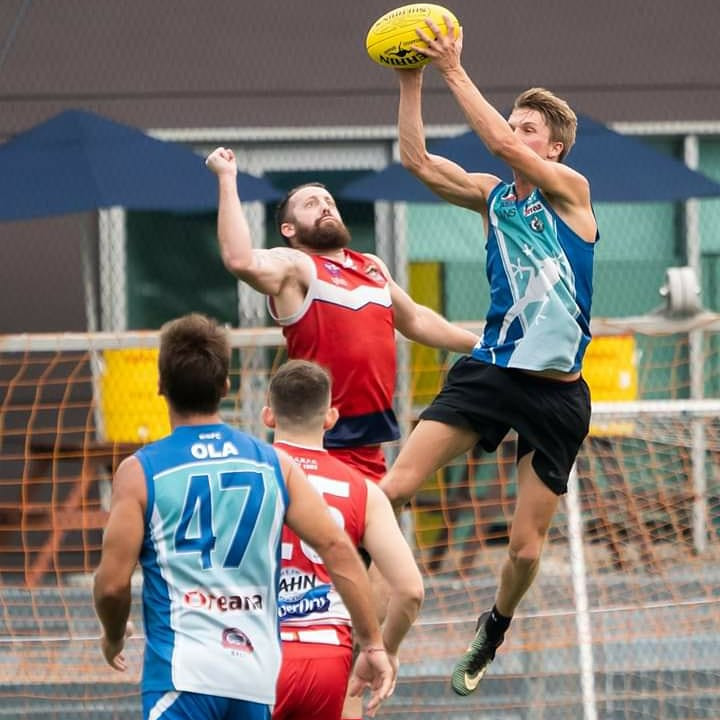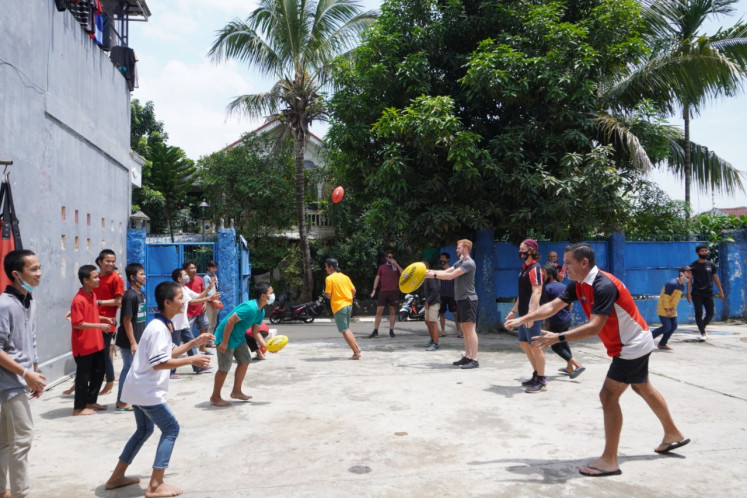AFL helps build solidarity among Australians, Indonesians during pandemic
While Australian Rules Football is considered “Australia’s game”, Aussies living in Indonesia are sharing the sport throughout Southeast Asia and helping local communities as they play.
Change Size

W
hile soccer is Indonesia's most popular sport, not many Indonesians are aware of other types of football, though they are played in the stadiums of one of Indonesia’s closest neighbors: Australia. Australian Rules Football (AFL) is played on an oval field almost twice as long as a soccer pitch, with four goalposts at each end. The aim of the game, during which players can kick and handpass the ball to each other, as well as tackle their opponents who have the ball, is to kick as many goals through the two middle goalposts as possible.
While AFL is considered “Australia’s game”, Aussies living in Indonesia are sharing the sport throughout Southeast Asia and helping local communities as they play.
In 1995, a group of Australian expats were sitting in a Jakarta pub when they had an idea that would change their lives in Indonesia.
“It was a few guys that used to drink at the pub together. One day we thought we should do something more than just drink beers so we said ‘why don’t we try and start a footy club’,” said Paul Halliday, founding member of the Jakarta Bintangs Football Club, referring to AFL by its nickname.
“At that time, there were very few teams in Asia. It’s now grown to 22 countries, to the likes of Pakistan, India, Mongolia. We’ve got around 14,000 participants across Asia at the moment.”
While COVID-19 forced the cancellation of AFL Asia competitions in 2020, the pandemic has not dampened enthusiasm for AFL in Indonesia, where teams like the Bintangs and their rivals, the Bali Geckos, have even been able to recruit players in the toughest of times.
Halliday says introducing AFL to Indonesians has been key to maintaining the Bintangs’ community during COVID-19.
“The good thing for the Bintangs is we have that commitment to locals. Now we can survive because we have that commitment,” he said.
“We’re always reaching out. You don’t have to be Aussie to play Aussie rules.”
Halliday added that the team managed to have training runs once a month during the lockdowns.
Importantly, the Bintangs have continued to support the community during the hardship of the pandemic, which has also translated into benefits on the footy field.

“One thing we’ve done over the last 12 years is to support an orphanage called Mama Sayang. If they’ve got a shortfall, we make sure their needs are met,” said Halliday, referring to an orphanage in Citra Indah City in Jonggol district, Bogor regency, West Java.
“Importantly, it’s been like a footy factory for us. Out of the orphanage, we’ve produced some really good footballers.”
He said the orphans had been like a savior to the club because twenty of them would always turn up to training.
Geckos coach Rick Olarenshaw said his football club had also been instrumental in maintaining morale during the pandemic.
“People in Bali don’t really fear COVID, so that’s why I don’t think we’ve had any issues getting people to training. They want to come to training, be fit and enjoy their social life,” he said.
“The Geckos have been a really great club in terms of connection. We’ve been training every week.”
Olarenshaw said the team had managed to recruit more players, especially for the women’s side, the Bali Pink Geckos.
He said the Geckos had also helped the community during the hardship of COVID-19, adding that the footy club had been great to give people physical and emotional support.
“That has been driven by our captain, Jack Ahearn, who raised A$20,000 (US$15,411) for Scholars of Sustenance in 2020. He did two ultra-marathons,” Olarenshaw said.
“The club supported Jack with those two events.”
Scholars for Sustenance is a movement that sources and serves surplus food to the community. It first started in Bangkok in 2016 and in Bali in 2017, the movement said on its website scholarsofsustenance.org.
Ahearn, who works at Seasons Bali drug and alcohol rehabilitation clinic, said he was amazed by the support his fundraising had generated.
His first run was in June when he ran 4 miles (6.4 kilometers) every four hours for 48 hours. The second run was from Lovina in the northern Buleleng regency to Canggu in the southern Badung regency in September to raise more funds for the Balinese people.
“It was not just 90 km, it was 90 km with a 30 km hill that goes 1,700 meters above sea level,” said Ahearn, who emphasized that he could not have accomplished the feat without his Geckos teammates.
“Everyone from the footy club was either there at the finish or running with me through some of the harder time slots. People turning up to run at midnight or at 4 a.m. There was so much support.”
Ahearn said he and the others probably would not still be in Bali if it was not for the footy club. “It has that big an impact on the Australian expats. It makes it more enjoyable to be here and share the game with not only the Indonesians but also people from different cultures, Europeans for example,” he said.
“There have been a lot of people from different nationalities joining in the last two years... It’s not just Australians.”
For Olarenshaw, joining the Geckos has been a highlight of his life in Bali over the last decade.
“Probably the best thing I ever did was join the footy club and meet the crew there,” he said.
“The Geckos share the AFL game in Bali and organize competitions with other teams in Southeast Asia”.
The coach said the club organized an Auskick program for both expat kids and local kids.
“We welcome people on holiday, encourage them to join and bring their kids down to do the Auskick,” he said.
“We have a ton of ex-professional players come and join us to train and play.”
Read also: Australian football team Jakarta Bintangs kicking goals with local community
As for diversity, Halliday said the Bintangs aimed to share the sport with people from diverse backgrounds.
“At the Bintangs, we’ve got a couple of Dutch guys, a couple of Irish guys, an English guy, it is pretty multicultural.”
“AFL has a role to play in sports diplomacy and improving the relationship between Australia and Indonesia.”
Halliday said the AFL International Cup, held in Melbourne every three years, had even sparked the interest of Indonesian diplomats.
“We were the first team in Asia to take a team to Australia to play in the 2014 AFL International Cup. We funded 25 young Indonesians so they could travel to Melbourne,” he said.
“The Indonesian consul general in Melbourne was that keen to see the Indonesian Garudas at the 2017 AFL International Cup that she was always the first to turn up to the games. She invited the guys to the Consulate General for a dinner. She’s certainly backing us to grow the sport within Indonesia.”
Halliday says Australian diplomats have shown equal interest in using sport to unite Australians and Indonesians.
“The Australian Embassy has been very strong on helping us to grow sports diplomacy,” he said.
“We have a young Indonesian lady from Central Java who the Bintangs and the Australian government support so she can run regular footy clinics for young girls in Central Java.”
Halliday also said there was an Auskick program in Jakarta, called IndoFooty, that runs every Saturday afternoon for 40 kids.
“When we have that running full pelt, we are going to 30 schools a week to provide sporting activities, not just AFL,” he said.
“We’re teaching them physical fitness, which a lot of the school’s do not have.”
Halliday says this investment in developing local talent is paying dividends for the Jakarta Bintangs.
“One of the young guys is a keen young 22-year-old Indonesian who can play some seriously good football and he is now the head of our development program.”
— The writer is an intern under the ACICIS program









